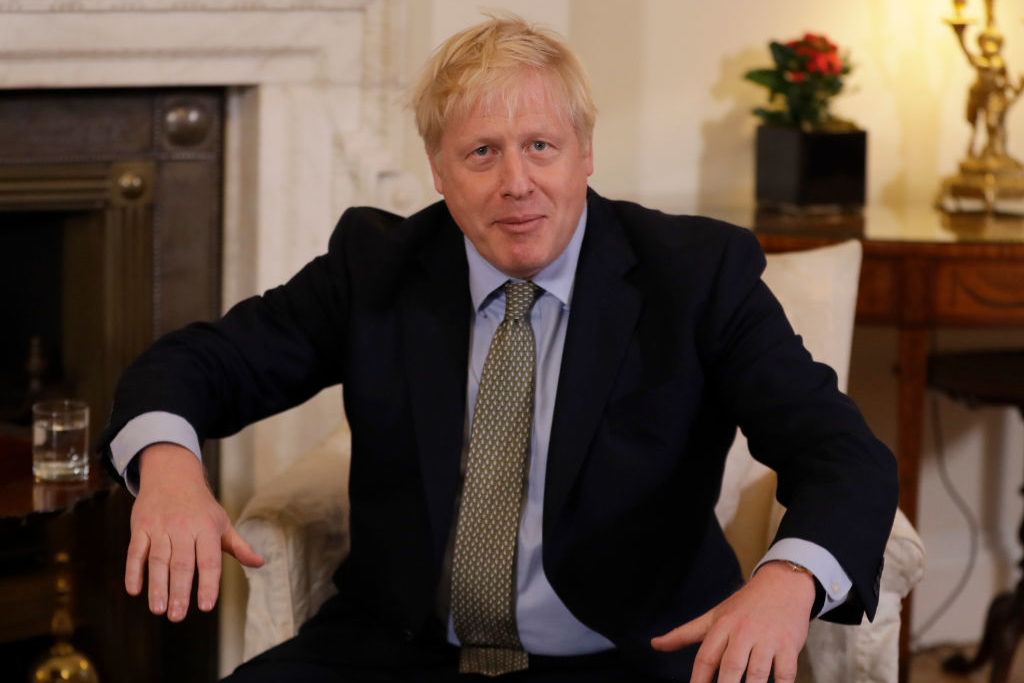The night before our last issue went to press, I received a message from the British prime minister saying that he was sorry, that he had hoped to write the diary but couldn’t find time. No problem, I replied, he’d just seen off Jeremy Corbyn and had a Queen’s Speech to agree and deliver and our print deadline was 10.30 a.m. At 7 a.m. the next morning, I woke up to find a new message ‘Have done diary. Am finishing now.’ At 10.20 a.m.: ‘It’s done. 860 words.’ Then another message: ‘Still in car.’ At 10.28 a.m., with two minutes to go, I gave up hope. Then, at 10.29 a.m., it landed, word-perfect. Boris Johnson likes to take things close to the wire, often to the despair of those around him. But he also tends to deliver, under circumstances that would stump most other people. It’s useful to remember this when considering his premiership: Boris is deceptively haphazard. Don’t be fooled. Judge him by what he achieves, and not by how he does it.
We’re told this will be his new criteria for others, too. A cabinet reshuffle is expected in the middle of next month, which is already being dubbed the ‘Valentine’s Day massacre’ by nervous ministers and their advisers. Being a strong media performer, we’re told, will not save you. Speaking for too long in cabinet meetings is also a mistake. The prime minister has no factions to keep happy, and has weathered enough derision from the press not to fear rude comments from people like me. So is he radical, or cautious? The manifesto was a bit safety-first. To govern in this way would be a huge waste. As one cabinet member puts it: ‘If you can’t take risks with an 80-strong majority and a crushed opposition, when can you?’
The first new year party in Westminster was thrown by Andrew Griffith, until recently the financial chief of Sky TV, now the newly elected Tory MP for the ultra-safe seat of Arundel and South Downs. He seemed to have half the cabinet there. ‘It’s great to have more business people like Andrew entering politics,’ one of his guests told me. Not necessarily, says another: after all, we were standing in the same Westminster home once owned by Adam Afriyie, an entrepreneur-turned-MP who went on to make no impact at all in parliament (aside from a weird attempt to supplant David Cameron as party leader). Then there was Archie Norman, a retail genius who saved Asda, but whose political career was a mystifying flop. Military men too: Dan Jarvis, who served with distinction in Kosovo and Afghanistan, was hailed as a potential leader when he joined parliament. Now that there is a vacancy, he’s not interested (or visible). Major Eric Joyce, a Labour MP elected in the 2000 Falkirk West by-election, found politics very frustrating and ended up headbutting Tories, including one in Strangers’ Bar. Liz Truss, another guest that night, told me her theory: businessmen and military men are used to command-and-control, which doesn’t work in politics. In his new book about military leadership, Andrew Roberts lists Xenophon, Pompey, Robert E. Lee and Stonewall Jackson as soldiers who perished in the field of political combat. Some, like Eisenhower, make a brilliant transition. The moral? Success in the real world tells you depressingly little about anyone’s prospects in politics.
I was at midnight mass at Downside Abbey for Christmas, where the Covent Garden soprano Mary Bevan was in the choir and sang ‘O Holy Night’. She did the same two years ago. Back then, when I had no idea who she was, I went up to her after Mass to ask if she’d heard Mariah Carey’s similarly ambitious rendition. I only found out later that she was one of England’s most accomplished opera singers. Mary gave nothing away: she just smiled and asked me to tell her more about Mariah — which I did, to my later mortification. This time I recognized her at once, so I took Alex, my 12-year-old, to the back of the basilica. We waited for the octave jump (on the last ‘divine’) so we could savor it. There’s only a small number of people in the country who can fill an abbey with the sound of a perfect high C. We listened in awe.
In all the madness, we’ve had to delay The Spectator’s Parliamentarian of the Year awards until later this month. The first step is to agree on the categories. Last time, we had ‘Resignation of the Year’ — such a hotly contested category that it had to be shared between David Davis and Dominic Raab, the first two Brexit secretaries. So what categories for this time? And any nominations? Suggestions to editor@spectator.co.uk. A pair of free tickets for the best one.
This article was originally published in The Spectator’s UK magazine. Subscribe to the US edition here.



















